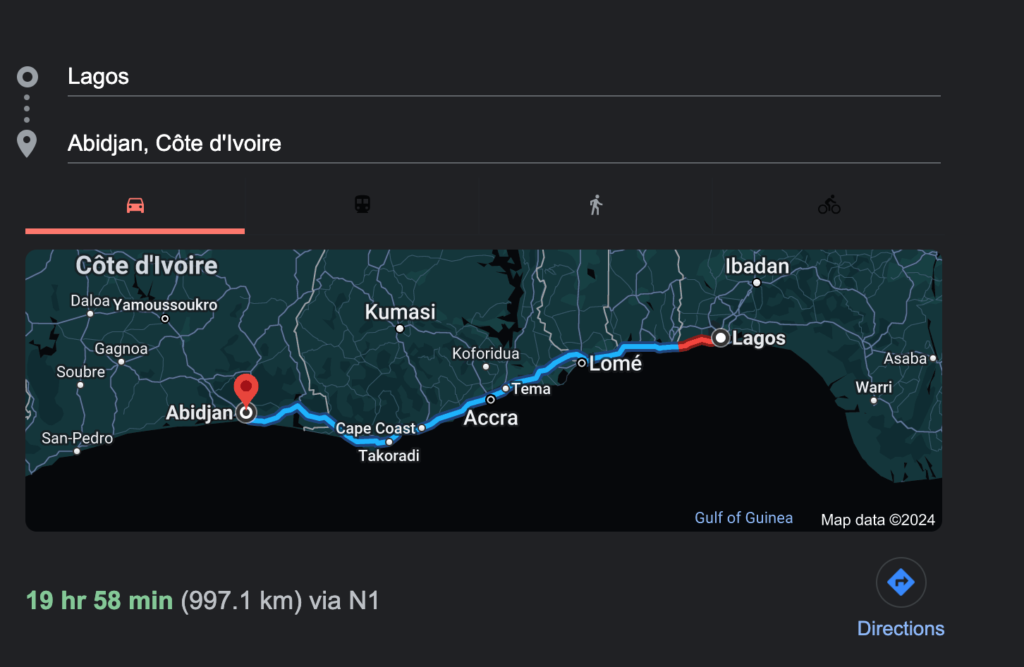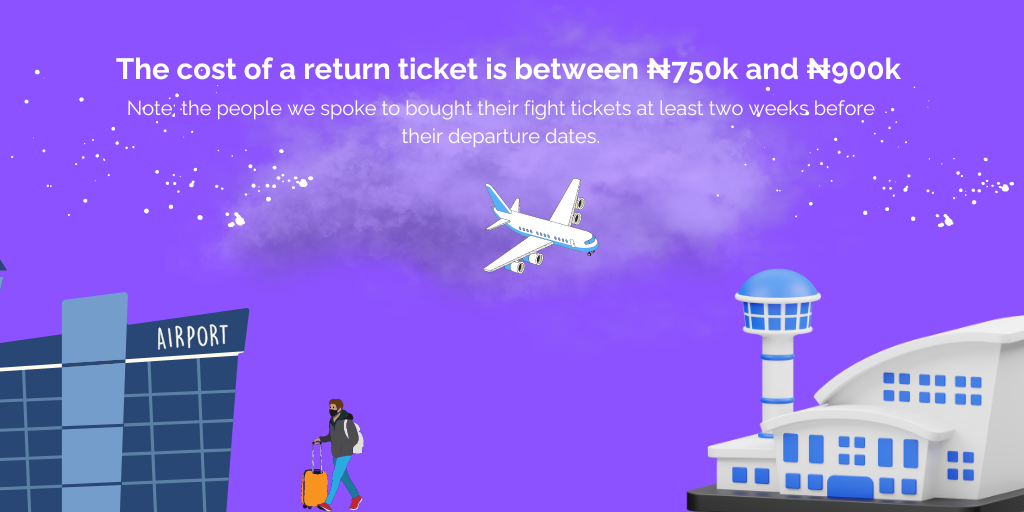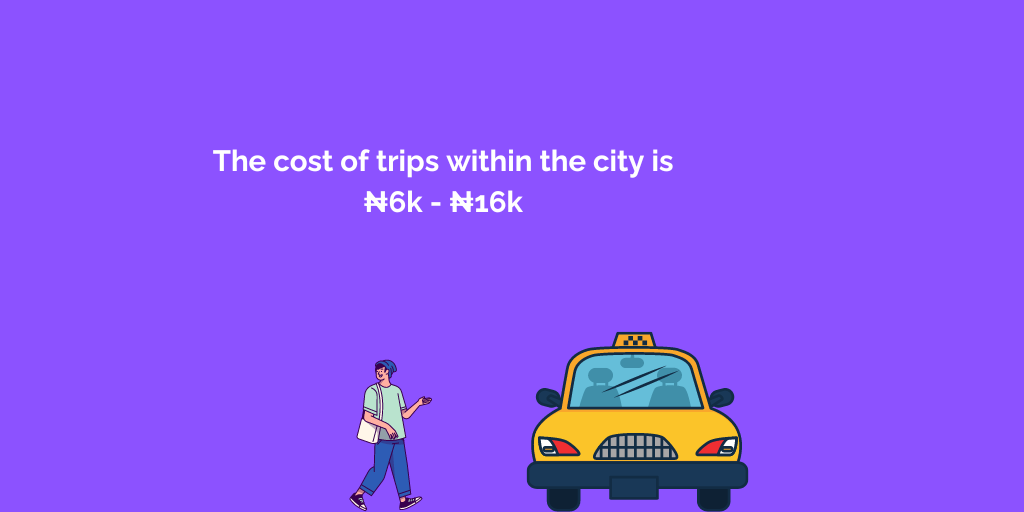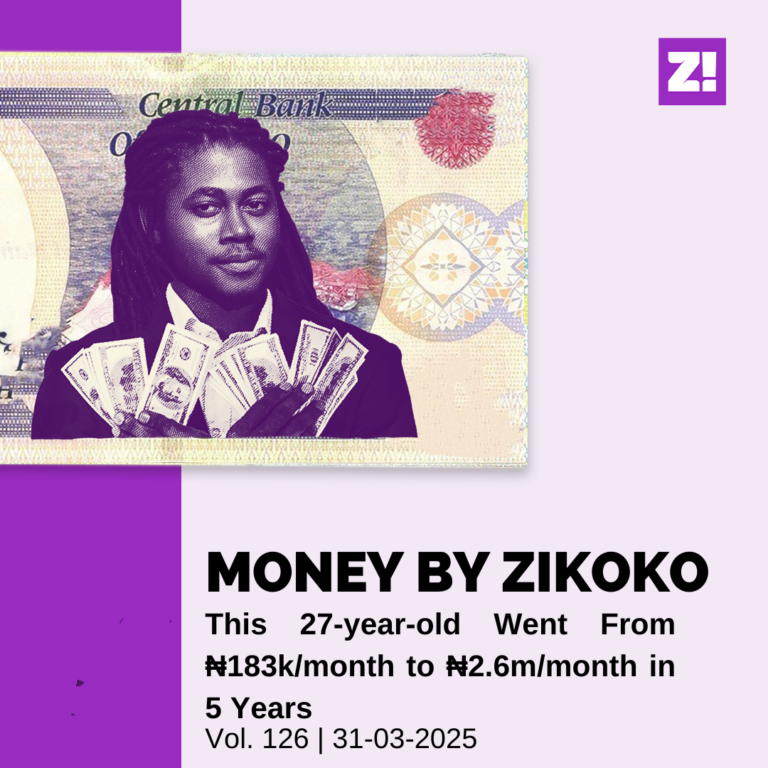On January 13, 2024, the 2023 campaign of the African Cup of Nations (AFCON) kicked off in Cote d’Ivoire. Every two years, 24 countries gather in a host country and, for one month, compete against one another with one goal: Becoming the champions of African football.
Since AFCON’s opening weekend, I’ve been curious about the costs of travelling to Cote d’Ivoire. Two reasons here: A West African country is hosting it. Also, I couldn’t help but notice, as did many others, the low supporter turnout in the first few matches of the tournament. One question everyone asked was how only a few Nigerians could travel to support the Nigerian Super Eagles in a tournament happening a few countries away.
We know why, don’t we?
Out of interest, I talked to three people who made the trip and asked them to explain how much they spent on their AFCON 2023 experience.
The cost of flight tickets

On a 1000 km stretch of road, three countries, border and immigration agents stand between Lagos and Abidjan, so there is no surprise that the people I spoke with travelled by air. “I paid ₦828k for a return flight ticket with Air Cote D’Ivoire from Lagos 11 days before my departure date,” said Suraj Oyewale, a businessman, who was in the country for a week to watch Nigeria’s first two group games — the 1-1 draw against Equatorial Guinea and the 1-nil victory over the hosts.
This wasn’t Suraj’s first time travelling across West Africa, and he remembers paying a fraction of the current prices for his previous trips. “In May 2022, I booked a return flight ticket for Lagos-Abidjan-Dakar three weeks in advance and paid ₦378k. Less than two years later, the price has doubled.”

Phatill, a sports journalist, got her Confederation of African Football (CAF) media accreditation for AFCON 2023 three weeks before the competition and booked her return flight immediately, paying ₦900k for the tickets. However, she briefly considered the thought of travelling by road with friends but decided what she’d save with this option wasn’t worth the potential stress. Why spend more than 20 hours on the road when you can spend two? “I wasn’t ready for the stress,” she said.
Ayoola, a filmmaker, booked his tickets on December 5, 2023, against his January 14 departure date and paid $705. While he didn’t make the trip by road, he notes that public transport is the most economical solution to navigating West African countries. Two years ago, he paid ₦120k for a seat in a 4-seater on a trip to Cotonou.
The cost of accommodation
During his week-long stay in the host country, Suraj lodged in a 2-star hotel in Cocody, an upscale area in Abidjan, and paid 54 286 CFA per night. One critical thing to note: ₦1 currently exchanges for 1.5 CFA on the official market and 2 CFA on the black market. Suraj couldn’t get official rates, so he ended up paying over ₦100k/night for a hotel accommodation that should have cost ₦82k/night.

Phatill and Ayoola, on the other hand, got better deals. They have family and friends in Abidjan who took them in for free. But Phatill notes that Cocody is one of the best locations for visitors in the city.
“Cocody is close to everywhere. But the cheapest hotel you might find in Cocody won’t be less than 40,000 CFA (₦80k) per night.
The cost of feeding
Suraj’s hotel bill didn’t include complimentary breakfasts. Instead, the hotel offered him a 4000 CFA (₦8k) per breakfast service, which he didn’t take. “When I arrived in Abidjan, I shopped at a mall and spent 20000 CFA (₦40k) for bread, biscuits, yoghurt, cashew nuts, butter, juices and apples. These were my breakfast during my stay. “
This hack sustained him through most of the days, but there was still the tiny matter of dinners, and he sorted them with visits to a restaurant close to his hotel. “My chicken meal with sides, juices and water cost an average of 8000 CFA (₦16k) per meal,” he said.

Suraj believes several factors affect restaurant food prices, but he estimates the cost of decent meals in the city to be around 4000 CFA (₦8k) and 10000 CFA (₦20k). Although Phatill has had to eat out several times, living with family has helped her reduce her feeding spend. She also agrees that the type of food and restaurant determines the cost and puts the number at least 3000 CFA (₦6k).
The cost of intra-city transportation
Cocody may be a location of choice for visitors in Abidjan, but the AFCON stadiums are spread across five cities: Abidjan, Yamoussoukro, Bouake, Korhogo and San Pedro. Everyone I spoke to confirmed that it’s relatively easy to move within the city with taxis, Uber and Yango, another ride-hailing service operating in the country.
One of the biggest perks of Phatill’s media pass is the access to media buses travelling to the stadiums across the country. She only needs to make her way to the media centre in Abidjan, which serves as the rendezvous point. She’s found taxis and ride-hailing services useful for these short trips.
“I use Yango to move from my house to the media centre in Treichville Centre, and the average fare is around CFA 3000 (₦6k) – CFA 4000 (₦8k),” she said.

Similarly, Ayoola moved around with Uber and Yango, and the average cost of his trips hovered around CFA 6000 (₦12k). “I used Yango to get to the stadium for the Nigeria vs Ivory Coast match. It was a 39-minute trip, and I was charged 6600 (₦13200) CFAS for it. For my ride back to town, I jumped on a bus conveying people from the stadium to the city centre. It was free of charge,” he said.
Suraj, however, opted for the more traditional method of flagging down roadside taxis in the city. “I spent CFA 8000 (₦16k) for an hour taxi ride to the Allasane Outtara stadium to watch the Nigeria vs Equatorial Guinea game. I made the trip back to my hotel on one of the free buses.”
The Super Eagles technically have three more AFCON 2023 matches to play, but they’ll need to win each to advance to the next rounds and emerge as champions. Even if we can’t all make it to Cote d’Ivoire, millions of Nigerians will enjoy seeing the national football team go all the way.





